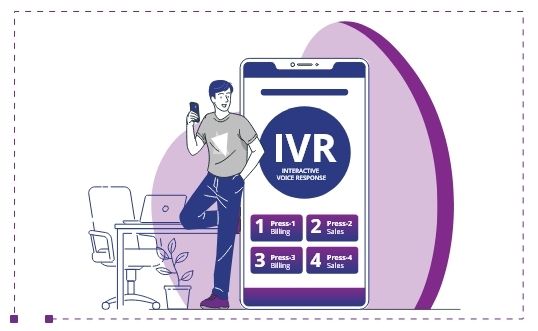What is IVR Solution and Explain its Key Features and Advantages?

In customer service and business operations, efficiency and effectiveness are paramount. One technology that has significantly contributed to streamlining these processes is Interactive Voice Response (IVR) solutions. IVR has become an indispensable tool for businesses of all sizes, enabling them to handle customer inquiries and automate various tasks. In this blog, we will delve into what IVR solutions are, explore their key features, and highlight their numerous advantages.
What is the IVR Solution?
Interactive Voice Response (IVR) is a technology that allows automated interaction between a computerized system and callers through voice and touch-tone keypad inputs. IVR systems are commonly used in telephone systems to manage and route calls, provide information, and even complete transactions without the need for human intervention.
Here's how an IVR solution typically works:
Call Routing: IVR can route incoming calls to specific departments, agents, or extensions based on pre-defined rules, such as the caller's input or caller ID.
Information Delivery: IVR systems can deliver pre-recorded information to callers, such as business hours, account balances, or product details.
Transaction Processing: IVR allows callers to complete transactions like bill payments, booking appointments, or ordering products or services through automated menus.
Data Collection: IVR systems can collect and store caller information and preferences, helping businesses personalize future interactions.
Now that we understand the basics, let's delve into the key features and advantages of IVR solutions.
Key Features of IVR Solutions

1. Call Routing and Transfer: IVR systems can intelligently route calls based on criteria like caller input, language preference, or caller history. This ensures callers are directed to the most suitable agent or department, reducing wait times and enhancing customer satisfaction.
2. Self-Service Options: IVR systems offer a range of self-service options, allowing callers to perform tasks independently. This includes checking account balances, making payments, or updating personal information. Self-service options can significantly reduce call volumes and improve efficiency.
3. Personalization: Modern IVR services have the capability to use caller data to personalize interactions. Callers can be greeted by name, and their previous interactions and preferences can be taken into account to provide a more tailored experience.
4. Multilingual Support: IVR systems can support multiple languages, ensuring that businesses can effectively communicate with a diverse customer base. This feature is crucial for global companies and those operating in multicultural regions.
5. Integration with CRM Systems: Many IVR solutions integrate seamlessly with Customer Relationship Management (CRM) systems, allowing for a more holistic view of customer interactions. This enables businesses to offer more informed and personalized support.
6. Analytics and Reporting: IVR systems capture data on caller behavior, call volumes, and service effectiveness. This data can be used to make data-driven decisions, identify areas for improvement, and enhance the customer experience.
Advantages of IVR Solutions

1. Improved Customer Service: IVR solutions enhance customer service by providing 24/7 accessibility and quick access to information and services. This reduces customer frustration and ensures a positive experience.
2. Cost Efficiency: By automating routine tasks and call routing, IVR solutions help businesses reduce the need for a large number of customer support agents, resulting in significant cost savings.
3. Increased Productivity: IVR solutions free up human agents to focus on more complex and value-added tasks, increasing their productivity and job satisfaction.
4. Consistency: IVR systems provide consistent and accurate information, ensuring that all callers receive the same level of service, regardless of the time of day or the agent they interact with.
5. Scalability: IVR solutions can easily scale to accommodate growing call volumes and changing business needs, making them suitable for businesses of all sizes.
6. Data Collection and Analysis: The data collected by IVR systems can be used to gain valuable insights into customer behavior and preferences, helping businesses make informed decisions and refine their strategies.
Conclusion
In conclusion, IVR solutions have become an indispensable tool for businesses looking to streamline their customer service and operations. With their key features like call routing, self-service options, and personalization, and the numerous advantages they offer in terms of cost-efficiency, improved customer service, and scalability, IVR solutions are an essential technology for modern businesses looking to stay competitive and provide exceptional service to their customers. Connect with us today!
Written By: Manna Khare

